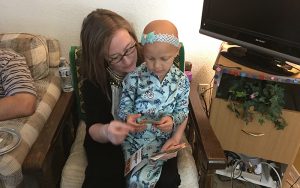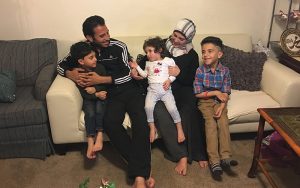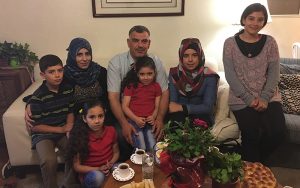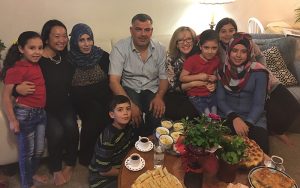- Slug: BC-CNS-Syrian Refugee Connection, 1518
- Photos available (thumbnail, caption below)
By MINDY RIESENBERG
Cronkite News
PHOENIX – Debbie Rhoads Crenshaw saw a Facebook post on a local community page a year and a half ago asking people to adopt a Syrian refugee family at Christmastime.
Already active in her community, Crenshaw had seen news reports about the war in Syria and realized that she could make a difference by supporting refugees settling in the Phoenix area.
“When I went to give the family gifts, I met a Syrian-American woman who mentored me and began introducing me to other Syrian refugee families. I started collecting and delivering items to them,” Crenshaw said.
Soon she was being introduced to one family after another that needed basic supplies, furniture, and other items. She reached out to family and friends on Facebook to find donations.
Because the response was so overwhelming, Crenshaw created Syrian Refugee Connection, an all-volunteer group that assists newly settled Syrian refugees in the Valley.
“We see that it is worth it to our community, our state, and our country to welcome and embrace refugees and help them find success in America – their success is our success,” she said.
To find donations and assistance, the group posts requests on a closed Facebook group page. It also keeps a “wish list” spreadsheet of the items the families regularly ask for.
Basic items, like cleaning supplies, personal hygiene items, clothing and items food stamps cannot buy, are kept in a storage closet.
Crenshaw said they also try to store culturally useful items such as large stockpots for cooking (some of the families have more than nine members) and meat grinders for traditional Syrian recipes.
The idea is to tailor the services to whatever it is the families need to fill in the gaps above and beyond what refugee assistance agencies are able to provide.
Adopting – the key to making it work
Connecting Syrian families with American families of various religious and cultural backgrounds helps the refugees learn about America’s diversity while teaching the American families about Syrian life and customs.
In a cozy apartment in Phoenix that is rented by a refugee family, Nancy Speidel and Tracy Nishida sit among the families they have taken under their wings.
Most of the furniture in the apartment has been donated through Syrian Refugee Connection.
Nishida explains the deep bond that the families have forged.
“I can’t believe I’ve only known everyone since November,” Nishida said, “because they’re so important to me.”
Nishida and Speidel visit their adopted families weekly, making sure they are doing well and checking to see if they need anything.
“When the children see Nancy and Tracy, they’re very excited,” Zahar Mahasna, the father of one of the families, said through a translator.
“It’s like a member of the family is coming to visit,” he said.
This sense of family is important to the refugees who arrived in Phoenix alone and worried.
“When I first met them, I thought they would not come back,” said Eman Abo Shanab, a mother of three in her 30s who has been in the U.S. for seven months.
An English teacher in Syria, Abo Shanab said in English that she hadn’t met any Americans before meeting her adoptive families. She appreciates the assistance she is receiving, she said.
“They give us hope through the relationship, we know the reality of the American people through them and we know we are welcome here,” she said.
“I love America more now after meeting them – Nancy is like my aunt and Tracy is like my big sister,” said Abo Shanab’s husband Manhal Alharira.
The volunteers and the refugee families socialize together through shopping trips, visits to restaurants, and spending holidays at each other’s homes.
Nishida has two children who have befriended the refugee families’ children.
“I connect as a mother trying to make a better life for my kids,” she said.
Kim Aiello is another adoptive resident who said the experience of helping Syrian refugees has transformed her life and her children’s lives.
“I love most of all the experience for my children to truly gain a deeper appreciation for Islam, refugees, and their experiences,” she said.
Aiello found out about Syrian Refugee Connection through a friend who was helping with a holiday donation drive for refugees.
“At the event, the refugee children were asked what they’d do if they had a million dollars, and the children would answer that they’d buy a pair of socks, a backpack, a soccer ball, and things like that,” she said.
“It was very moving and I signed up to adopt a family because of it,” she added.
Aiello said she wants people to be aware that refugees who arrive in the U.S. face unique hardships – they usually have spent years in refugee camps, are responsible for paying back the cost of their flights to America, and only receive three months of subsidized housing once they get here.
“The family I adopted lived in Jordan for two years before they received permission to come to the U.S., and in Jordan, there’s a lot of anti-refugee sentiment,” she said.
“The kids weren’t even able to have formal schooling while they lived there,” Aiello added.
She said that since the presidential election, her adopted family has been very fearful of what may happen to refugees.
“Most people are really supportive,” Aiello said, “but there’s a lot of misunderstanding about refugees, their experience, and about Islam.”
Acceptance of refugees in Arizona
Responses Cronkite News received to a Public Insight Network query about refugees back Aiello up.
When asked if she’d be accepting of new refugees to Arizona, Leslie Fish of Mesa replied no.
“I’ve studied history, and I know too much about the culture those ‘refugees’ come from,” she wrote.
“They are not able to be assimilated, have no intention of assimilating, and they’ve been known to kill their own children who show tendencies of assimilating,” she continued.
Louis Cespedes of Tucson agreed.
“We can’t let criminals and terrorists into our country,” he wrote. “Just because a person is fleeing a country does not mean that they are good people.”
But others who responded to the questionnaire disagreed with that sentiment.
“Using incidents of wrongdoing by a minority is simply another example of condemning the masses for the conduct of the few,” wrote Ken Benner of Tucson.
Debra Baldauff of Phoenix wrote that she believes “exposure to people who are ‘different’ is important in breaking down negative stereotypes.”
The challenges of being a refugee
In another apartment in central Phoenix, Crenshaw sits with two families who had recently arrived in the U.S.
Unlike the families that Nishida and Speidel adopted, these refugees have mixed feelings about coming to America.
“When we arrived, we thought that America would be bigger – New York style,” said Omar al Ajan, a young father of two daughters.
But Phoenix is not what he imagined.
He said that after leaving Syria, he was able to continue to work as a plumber and earn a good living in Jordan. Since he moved to the U.S. he has had to take a job as a dishwasher because he doesn’t speak English well.
“My supervisor thinks I’m stupid because I don’t know what he’s saying, but I am not stupid, I just don’t understand,” al Ajan said.
He also worries about the new presidential administration.
“Everybody is afraid of what (President) Trump is doing,” he said.
Al Ajan said that now he thinks his family may be better off in Canada.
However, the friendship with Americans has helped ease the trauma of being refugees from the bloody war in Syria.
“There is zero trauma counseling given to them – this system is set up only for the strong,” Crenshaw said.
Al Ajan quietly mentioned that he and his family saw many dead and wounded family and friends during the war in Syria, including children.
He was shot five times, and rolled up his pant leg to show a bullet wound scar.
“Where we lived, 2,000 people were killed,” he said. “We come here just for peace.”
Joining forces to provide more help
The Syrian Refugee Connection now includes diaper drives, a “sweets exchange” to sell traditional Syrian pastries, and a Syrian dinner club.
Looking to the future, Crenshaw has partnered with One Light Global, an international refugee assistance program which has taken Syrian Refugee Connection under its nonprofit umbrella.
“Their mission and focus mirrored ours just on a more global scale,” Crenshaw said.
The partnership will help the group expand to help refugees find homes, learn English and find jobs.
“We have doctors, dentists, construction workers, plumbers, electricians, and more who have a lot to give that are currently willing to work as dishwashers and drivers at the airport, but we want to help them get into a better place,” Crenshaw said.
“Nobody chooses to be a refugee, but your home is where your heart is, and we feel now that America is our home,” Alharira said.
“We came here to be safe, to educate our children and to live in safety,” he said. “We hope to make a difference in America and to give Americans a good idea about us.”
Overall, Abo Shanab pointed out that it’s not really about receiving furniture and supplies from the volunteers, but about the relationships.
“We want people to smile at us and know us – it’s the friendship, that’s what we need,” she said.
^__=



